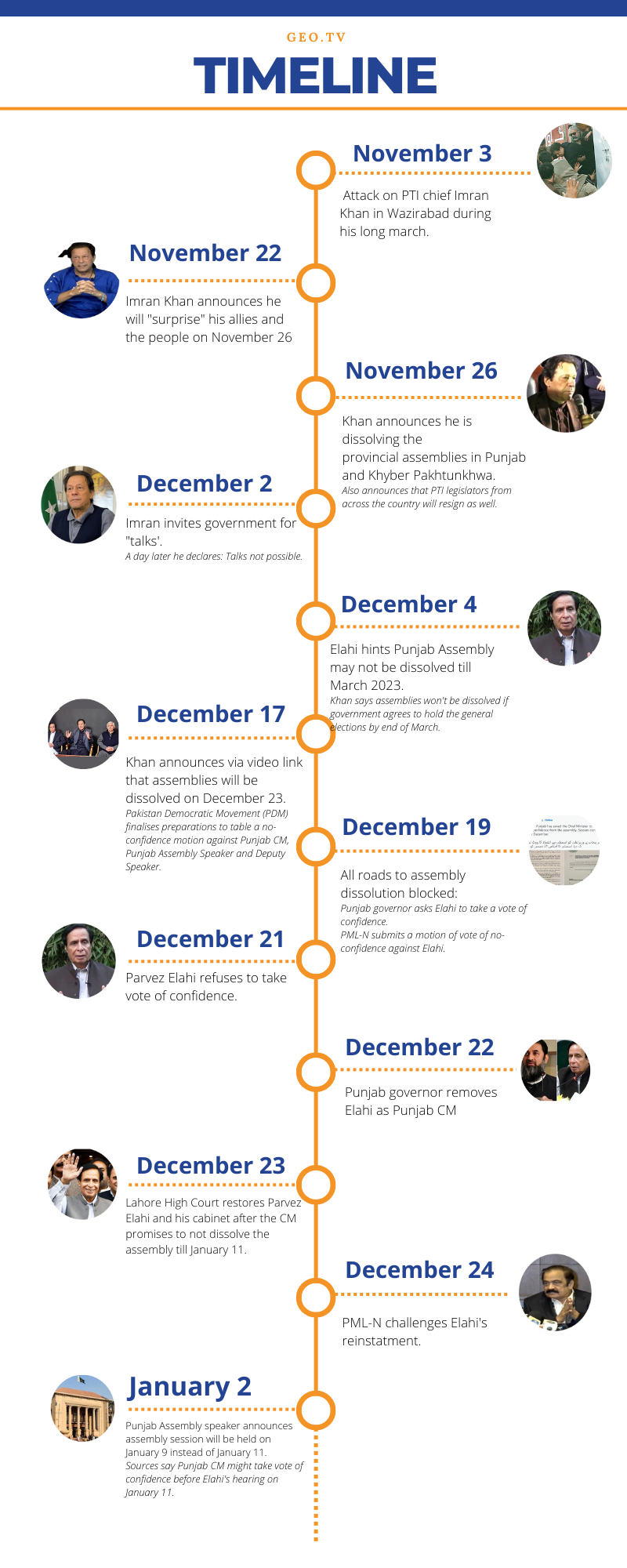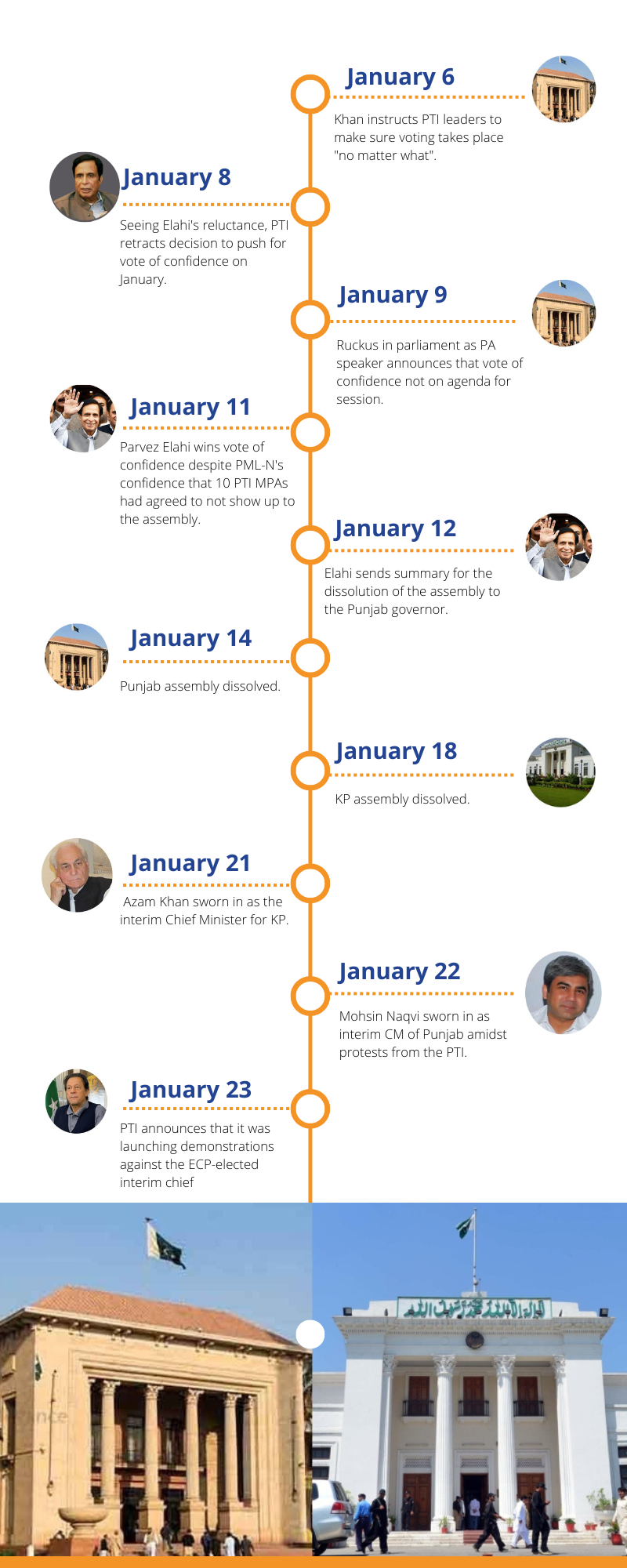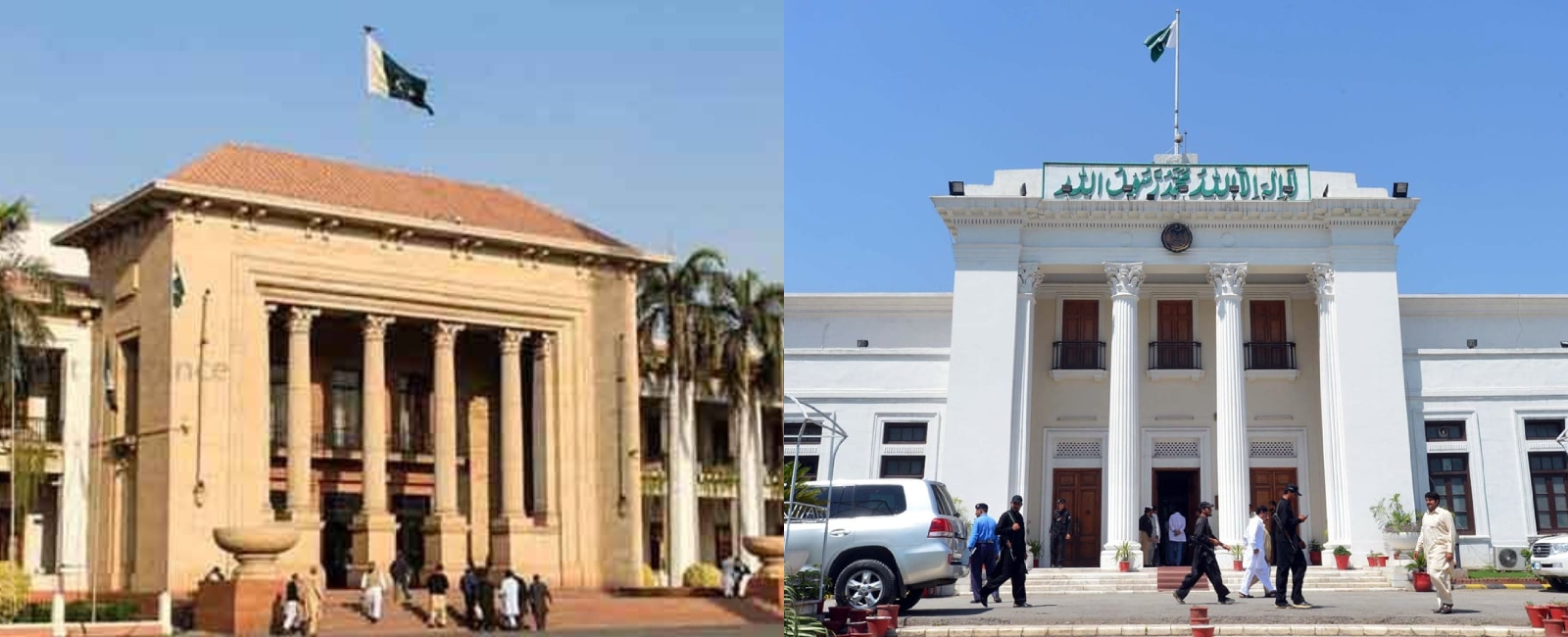Much ado about nothing: dissolution of Punjab, KP assemblies

Ever since the Pakistan Tehreek-e-Insaf (PTI) Chief Imran Khan was ousted from the government in April 2022, he has had only one demand: fresh elections.
A demand that Prime Minister Shehbaz Sharif persistently ignored, forcing Khan to lead a long march to Islamabad.
Amid dwindling numbers and many delays, his rally inched forward. Many statements were issued and retracted; accusations were levied; and vitriol was spewed by the PTI and the Pakistan Democratic Movement (PDM) on each other.
Khan announced on November 22, 2022, that he had a "surprise" for his allies and the government, one that he would reveal in his November 26 address to a public rally in Rawalpindi last year.
After much speculation and suspense, Khan unveiled that PTI would distance itself from the present “corrupt political system” by dissolving the assemblies of Khyber Pakhtunkhwa and Punjab.
Initial reaction
The immediate response to the announcement was shock and perplexity from all quarters. The PTI's senior leaders, however, seemed undeterred. The party's vice-president, Fawad Chaudhry, shared that after PTI’s resignations, elections would have to be held on a total of 563 seats out of 859.
Chaudhary said: "By-elections would have to be held on 123 seats in National Assembly; 297 seats in Punjab Assembly; 115 seats in Khyber Pakhtunkhwa Assembly; 26 seats in Sindh; 26 seats in Balochistan."
The rationale
The idea behind the decision seemed to be that there would be little sense in having by-elections on such a massive scale (66% of the seats in the national assembly and all provincial assemblies would become vacant after this move) rather than simply calling a general election ahead of schedule.
Then-chief minister Chaudhry Parvez Elahi — a leader of the Pakistan Muslim League-Quaid (PML-Q) and an ally of the PTI chief — declared he stood by Khan, who had “played a “decisive round” and the PDM government would "disintegrate" when resignations were tendered from the KP and Punjab assemblies."
Trouble in paradise
Despite the reaffirmations by Elahi and his son, Moonis Elahi, that they stood by Khan’s decisions, it was evident that the PML-Q leaders and some lawmakers in Punjab wanted to delay the dissolution of the Punjab Assembly.
Over the next few weeks, it became glaringly obvious how persistently Elahi wanted to cling to the chief minister's (CM) seat.
Political Fine Print (The News International: Editorial, December 6)
“... It would not be an exaggeration to say that Moonis and his father have managed to rain all over Imran and his party’s parade... Even if the Elahis were to play ball – and there is no saying never in politics – the ECP has already said that dissolution of provincial assemblies does not translate into general elections. The PDM too is holding steady (as can be) at the centre. The PTI is evidently trying to make amends for the past few months of allegations and rhetoric, with its representatives reaching out to US diplomats, and also openly stating that they would want only improved relations with the establishment – military and judicial both. The PTI – much like all other parties before it – may be finding out, much to its chagrin, that alliances made without reading the fine print can lead to complicated situations.”
The date announced
On December 17, with the Punjab CM and Khyber Pakhtunkhwa Chief Minister Mehmood Khan by his side, he announced that the two assemblies would be dissolved by December 23.
Roadblocks to dissolution
Two days later, the Punjab Governor Baligh Ur Rehman asked then-CM Elahi to take a vote of confidence from the assembly, while Pakistan Muslim League-Nawaz (PML-N) submitted its motion of vote of no-confidence, blocking the way to a possible dissolution of the Punjab Assembly.

Elahi emphatically refused to take the vote, which led to the Rehman ruling that he had lost the confidence of the majority of the members. Rehman then removed Elahi from the post of the CM.
Elahi immediately took the matter of his dismissal to the Lahore High Court (LHC). The LHC, after extracting a promise from him that he would not dissolve the PA before January 11 (the date of his next hearing), restored Elahi as the CM. This decision was then challenged by the PML-N.
To vote or not to vote
The start of the new year brought about yet another complication. Elahi’s reluctance to leave the post of the CM became even more obvious. Inevitably, the relationship between Elahi and Khan seemingly soured on this matter, and several PML-N leaders hoped and stated that the PML-Q was coming back. On January 6, the PTI chief ordered party leaders to ensure that voting takes place “no matter what”. It was believed that the PTI wanted to ensure that when Elahi went to court on January 11, he took with him news that he had won the vote.
However, two days later, the PTI leadership retracted and announced that it had decided that it would not take a vote of confidence after all. On January 9, the PA speaker claimed that Elahi’s trust vote was not part of the assembly’s agenda, which led to a ruckus in the
'Redlines' and 'bribes'
On January 9, Interior Minister Rana Sanaullah declared that the then-CM was bound to take the trust vote. He announced that he was in touch with 10 PTI MPAs and he was confident that Elahi would lose the vote.
Fawad then claimed that five MPAs of his party were offered Rs1.2 billion to change loyalties while the PTI chief in yet another address via video link announced that his allies were being told that a “red line: was being marked on him.

Checkmate
After all this drama, late on January 11, Elahi finally took the vote of confidence and won. His win came as a shock to PML-N members who were lambasted by PML-N supremo Nawaz Sharif for "carelessness".
Dissolution at long last
The day after Elahi won the vote of confidence, he sent the summary for the dissolution to the Punjab governor, who refused to sign the document saying that he could not be a party to such a travesty.
Throughout all this, the KP CM patiently waited, having said that the dissolution of the KP Assembly would be delayed till the fate of the Punjab Assembly was decided. However, after the dissolution summary was sent by the Punjab CM, the KP CM moved for dissolution as well. On January 14 the Punjab assembly stood dissolved while the KP was dissolved on January 18.
Understanding the PTI rationale
From the very day that the PTI announced its decision to dissolve the assemblies, political pundits and analysts across the country were left confused. It was beyond comprehension why the PTI which had struggled so hard to gain power in Punjab was willingly giving it up.
Khan’s declaration that he wanted to dissociate from the “corrupt system” raised the question of why the PTI had participated in the Sindh LB polls when its leaders had already declared they would resign from assemblies across the country. Moreover, there is the question as to why the PTI MPAs in Sindh and Balochistan have not resigned.
Another reason that Khan had given for the decision was that it wanted to push the government to expedite general elections since there would be little sense in having by-elections on such a huge scale.
Political analysts writing for several dailies have less than generous opinions on why Khan was eager to dissolve the assemblies. Many considered the move to be his only possible hope for calling the elections and even staying relevant.
Per some analysts, the fact that attendance at PTI rallies had reduced and that the PDM had to successfully conclude the November appointment saga, had forced Khan’s hand to this move in a bid to stay relevant in the political scenario.
Others said that Khan’s threat was meant to be a “reminder” to the establishment that if its demands were not met, it could make governance very messy.
Faizan Bangash, a senior journalist, who has reported on the happenings of the PA from the get-go claims that Khan’s move to dissolve the assembly has hurt his own endeavours.
“Instead of dissolving the assemblies, he [Khan] could have worked to bring about positive changes for the people. Especially since the PDM-led government is not doing well on most fronts, Khan could have used this opportunity to show his skills."
"The happenings of the last few months have brought no benefit to people. He could have caused more damage to the PDM if he had stayed in KP and Punjab ” he said.
Many have also criticised Khan for failing to prioritise assisting victims of flood relief when it was most needed. Although Khan had gathered around Rs4.8 billion for the victims, a more active role could have proved more fruitful.
Others still have criticised Khan for playing into his ego.
"When Khan was ousted, it was thought that he would lose power in Punjab; however, Elahi’s selection as CM helped him retain that power. The PTI worked tirelessly to get him back to Punjab. But it seems as though he was madder about being the only person ousted," Bangash added.




